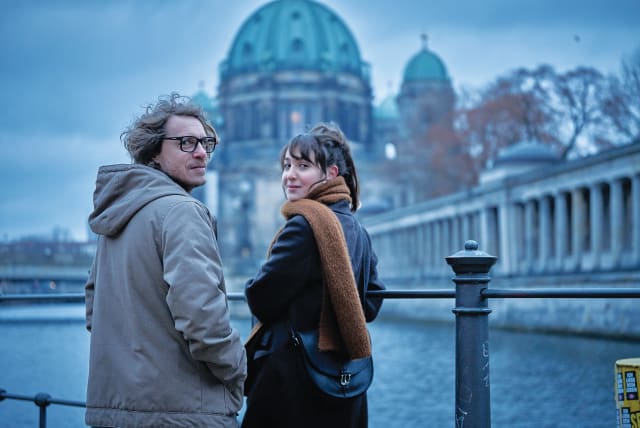New TV series ‘Berlin Blues’ brings Berlin to life

The series examines the drama caused by their being foreigners in a place that offers a stimulating artistic environment but is shadowed by the tragic history of the Holocaust.
Berlin Blues, an excellent series that recently became available on Yes, is about an Israeli couple, a musician and a writer, who move with their daughter to Berlin.
It examines the drama caused by their being foreigners in a place that offers a stimulating artistic environment but is shadowed by the tragic history of the Holocaust. It also shows, very convincingly and sympathetically, how dormant problems in a couple’s relationship can be stirred up by such a move.
It was created by real-life married couple Itamar Rotschild, a musician, and Dana Idisis, the writer of such series and movies as On the Spectrum and Here We Are, who moved to Berlin with their daughter a couple of years ago. They stayed for about a year, then returned to Israel.
Rotschild himself plays Yonah, the musician husband in the series. Shira Naor portrays Talya, his wife, a woman who has published a novel based on the story of her mentally ill brother, and Idisis has a brother on the autism spectrum, who was part of the inspiration for some of her recent work.
Given all these similarities, Rotschild, speaking from his backyard in a recent interview, wasn’t exactly surprised when I asked how closely the series was based on their actual life.
To what extent is the TV series based on real life?
“Let’s talk about the similarities. We moved to Berlin because I wanted the experience of living abroad for a few years. For Dana, it was after the first season of On the Spectrum and we flew there and lived there for a year and a half, with our daughter. We have two daughters now but then we had only one. For me it was nice there, I found myself there, I felt good.”
So many young Israeli couples spend at least a couple of years abroad that it’s practically a rite of passage, but there haven’t been many fictional portrayals of this phenomenon. Berlin, with its low cost of living and thriving arts scene, has become a destination for thousands of young Israelis. Rotschild and Idisis thought of that when they lived there, although Rotschild emphasized that despite the superficial parallels, it was not their story.
“We knew the feeling of being in Berlin and feeling foreign, but we created the stories,” he said. “It can be complicated in so many ways to live in a foreign country. There are lots of little things that you know how they are done at home, but in this new place, everything is different, and you have a feeling of being an outsider.”
That feeling puts Yonah and Talya’s marriage under a strain: “There were all kinds of problems before in their marriage, but they were kind of hidden, but here, in Berlin, everything is amplified. You are still you, but the new setting brings out things that were more under control before.”When Talya returns to Israel for a single episode, she is confronted by tough realities of the life she left behind there, notably that there are frequent missile attacks from Gaza during her visit – a disclaimer notes that the episode was filmed before October 7 – and that her brother and her parents are in denial about the severity of his mental illness.
In a particularly harrowing scene, he insists on returning to work at his job at the Ramat Gan Safari after he has been fired, and when Talya tries to take him home, he jumps out of the car near several hippopotamuses.
“You see that so much is hard for her in Israel, too, how complicated it is for her there.”
THE RELATIONSHIP of Israelis to Germany is also complicated in all kinds of ways and Berlin Blues deals with that head-on. When Yonah’s mother (Liora Rivlin) comes for a visit, she can barely contain her anger at her son for choosing to live in the country that persecuted her parents.
“Lots of people are ‘anti [German],’ because of their parents, people don’t want to buy German goods, wouldn’t want to buy a German car. I even know people my from my generation who won’t go to Germany... Yonah’s mother has a real issue that is connected to the trauma of what so many Jews went through there, and I think that we tried to show what’s behind it, and she isn’t just ‘anti,’ but you see at the end, with her monologue in German, that she has a real connection to the country because of her parents, she isn’t just ‘anti.’”
Another way that the series differs from his own life, Rotschild said, is that, “My music and the music in the series are two different things.” Rotschild is a guitarist and pianist who writes and performs in a folk-rock style. He has released a number of albums and is at work now on a new one, while Yonah is an oboist who gets a position with a Berlin orchestra.
“I was never in an orchestra. We thought about what would keep Yonah in Berlin, so that it makes the conflict between him and Talya, who wants to go home, stronger, and we thought of having him be an oboe player. The oboe is an instrument that maybe one or two people in orchestras can play full-time in Israel, but it’s hard to make a living at it here. But in Europe, you can make a living at it, there are a lot of orchestras there.”
Rotschild had never played the oboe and learned enough to look convincing handling the instrument on screen. “I had a very good teacher, Shani Shachar, and she taught me how to play it and hold it and how to blow in it and how to clean it and how to get a sound from it. It’s a very difficult instrument just to get a sound out of – and I’m not talking about a beautiful sound, just any sound at all.
“We did a lot of research to get into the world of classical musicians, to check how it sounds, how it feels, what it’s like, because it wasn’t a world we knew. It’s music that I like, but it isn’t music, or a world, that I really know.”
Rotschild said that the director of the series, Ram Nehari, who worked with them for two years, “helped to make the series what is today, he directed it beautifully and also worked on the scripts. He had a big influence on how well it turned out.”
Rotschild’s most important role prior to Berlin Blues was also as a musician, in the series, The Echo of Your Voice. Rotschild played a struggling artist who is the son of an Arik Einstein-like, all-time great performer, just as the Rotschild character’s own son becomes a rising star. In an unusual achievement, the three lead actors, Rotschild, Shaul Luria, and Orr Amrami Brockman, shared the award for Best Actor at the prestigious Series Mania competition in France.
But when asked whether he intends to continue acting, Rotschild said, “Acting is fun for me. It’s a kind of vacation, like taking a vacation from myself.” Despite his success as an actor, he said, “It’s not my profession. It seems to me that people who are professional actors have to take parts that are not what they really like, that are not that good, because that’s what they do.
“I’m not there. I only do things I like. So if someone brings me a part that I can connect to, I’ll do it gladly, it’s fun when you feel that you can express yourself through it. But I’m not an actor. I’m a musician who sometimes acts. “
Jerusalem Post Store
`; document.getElementById("linkPremium").innerHTML = cont; var divWithLink = document.getElementById("premium-link"); if (divWithLink !== null && divWithLink !== 'undefined') { divWithLink.style.border = "solid 1px #cb0f3e"; divWithLink.style.textAlign = "center"; divWithLink.style.marginBottom = "15px"; divWithLink.style.marginTop = "15px"; divWithLink.style.width = "100%"; divWithLink.style.backgroundColor = "#122952"; divWithLink.style.color = "#ffffff"; divWithLink.style.lineHeight = "1.5"; } } (function (v, i) { });

